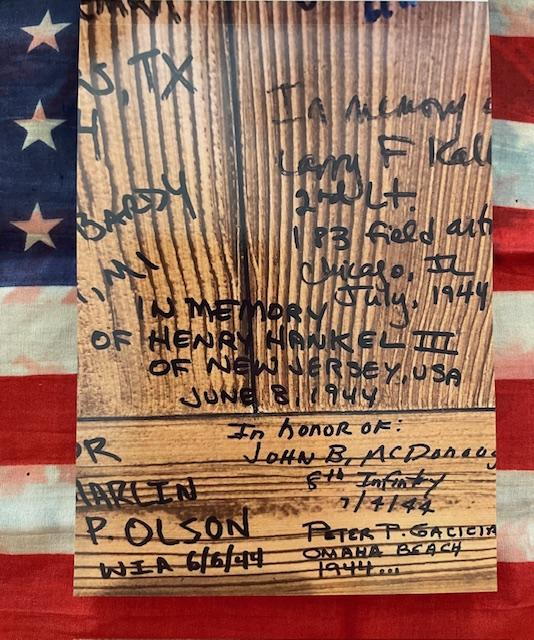Honoring Our Veterans: Reflecting on D-Day's 80th Anniversary and the Importance of Mental Health

- posted: Jun. 06, 2024
- Veterans
Honoring Our Veterans: Reflecting on D-Day's 80th Anniversary and the Importance of Mental Health
As we approach the 80th anniversary of D-Day, we are reminded of the immense sacrifices made by our veterans on June 6, 1944. This historic day marked a pivotal turning point in World War II, where Allied forces bravely stormed the beaches of Normandy to begin the liberation of Nazi-occupied France. Their courage and determination laid the foundation for the freedoms we enjoy today. As we honor their legacy, it is equally important to address the ongoing challenges that many veterans face, particularly in the realm of mental health.
Remembering D-Day: A Legacy of Bravery and Sacrifice
D-Day was one of the most significant military operations in history. Over 156,000 Allied troops, including those from the United States, the United Kingdom, Canada, and other nations, faced fierce resistance as they landed on the Normandy beaches. The bravery displayed by these soldiers in the face of overwhelming odds is a testament to their unyielding spirit and dedication to the cause of freedom.
As we commemorate this monumental event, it is crucial to remember not just the tactical victory, but also the human element. Each soldier who stormed the beaches had a story, a family, and dreams for the future. Many paid the ultimate price, and those who survived were often left with deep physical and emotional scars.

The Mental Health Struggles of Veterans
For many veterans, the battle doesn't end when they return home. The experiences of war can leave enduring psychological impacts, manifesting as post-traumatic stress disorder (PTSD), depression, anxiety, and other mental health issues. The rigors of combat, coupled with the loss of comrades and the transition back to civilian life, can create a complex web of emotional and mental challenges.
The stigma surrounding mental health can further exacerbate these issues. Veterans may feel reluctant to seek help due to fear of being perceived as weak or the belief that their struggles are a personal burden. This stigma can prevent them from accessing the care and support they need, leading to isolation and worsening mental health conditions.
Breaking the Stigma and Providing Support
To truly honor the legacy of D-Day and all veterans, we must prioritize their mental health and well-being. This involves a multi-faceted approach:
1. **Education and Awareness**: Raising awareness about the mental health challenges faced by veterans is crucial. By educating the public, we can foster a more supportive environment that encourages veterans to seek help.
2. **Accessible Mental Health Services**: Ensuring that veterans have access to high-quality mental health care is essential. This includes providing resources for therapy, counseling, and support groups tailored to their unique experiences.
3. **Community Support**: Building a strong support network can make a significant difference. Community organizations, veteran groups, and peer support systems can offer a sense of camaraderie and understanding that is vital for healing.
4. **Policy and Advocacy**: Advocating for policies that support veteran mental health is crucial. This includes funding for mental health programs, research into PTSD and other conditions, and legislation that removes barriers to care.
Reflecting on the Past, Committing to the Future
As we reflect on the 80th anniversary of D-Day, let us remember the bravery and sacrifice of those who fought on the beaches of Normandy. Their legacy is a reminder of the profound cost of freedom and the enduring spirit of those who serve.
In honoring their memory, we must also commit to supporting our veterans in their ongoing battles. Addressing mental health is not just about providing care; it's about recognizing their humanity, valuing their experiences, and standing with them as they navigate the complexities of life after service. By doing so, we ensure that their legacy of courage and resilience continues to inspire and guide us for generations to come.

The flag pictured in today’s blog was in the pocket of my Great Uncle, Henry Hankel, III when he arrived on Utah beach on June 8, 1944. I had the honor of visiting Omaha and Utah beaches on the 75th anniversary of D-Day.


- posted: Jun. 06, 2024
- Veterans
Honoring Our Veterans: Reflecting on D-Day's 80th Anniversary and the Importance of Mental Health
As we approach the 80th anniversary of D-Day, we are reminded of the immense sacrifices made by our veterans on June 6, 1944. This historic day marked a pivotal turning point in World War II, where Allied forces bravely stormed the beaches of Normandy to begin the liberation of Nazi-occupied France. Their courage and determination laid the foundation for the freedoms we enjoy today. As we honor their legacy, it is equally important to address the ongoing challenges that many veterans face, particularly in the realm of mental health.
Remembering D-Day: A Legacy of Bravery and Sacrifice
D-Day was one of the most significant military operations in history. Over 156,000 Allied troops, including those from the United States, the United Kingdom, Canada, and other nations, faced fierce resistance as they landed on the Normandy beaches. The bravery displayed by these soldiers in the face of overwhelming odds is a testament to their unyielding spirit and dedication to the cause of freedom.
As we commemorate this monumental event, it is crucial to remember not just the tactical victory, but also the human element. Each soldier who stormed the beaches had a story, a family, and dreams for the future. Many paid the ultimate price, and those who survived were often left with deep physical and emotional scars.

The Mental Health Struggles of Veterans
For many veterans, the battle doesn't end when they return home. The experiences of war can leave enduring psychological impacts, manifesting as post-traumatic stress disorder (PTSD), depression, anxiety, and other mental health issues. The rigors of combat, coupled with the loss of comrades and the transition back to civilian life, can create a complex web of emotional and mental challenges.
The stigma surrounding mental health can further exacerbate these issues. Veterans may feel reluctant to seek help due to fear of being perceived as weak or the belief that their struggles are a personal burden. This stigma can prevent them from accessing the care and support they need, leading to isolation and worsening mental health conditions.
Breaking the Stigma and Providing Support
To truly honor the legacy of D-Day and all veterans, we must prioritize their mental health and well-being. This involves a multi-faceted approach:
1. **Education and Awareness**: Raising awareness about the mental health challenges faced by veterans is crucial. By educating the public, we can foster a more supportive environment that encourages veterans to seek help.
2. **Accessible Mental Health Services**: Ensuring that veterans have access to high-quality mental health care is essential. This includes providing resources for therapy, counseling, and support groups tailored to their unique experiences.
3. **Community Support**: Building a strong support network can make a significant difference. Community organizations, veteran groups, and peer support systems can offer a sense of camaraderie and understanding that is vital for healing.
4. **Policy and Advocacy**: Advocating for policies that support veteran mental health is crucial. This includes funding for mental health programs, research into PTSD and other conditions, and legislation that removes barriers to care.
Reflecting on the Past, Committing to the Future
As we reflect on the 80th anniversary of D-Day, let us remember the bravery and sacrifice of those who fought on the beaches of Normandy. Their legacy is a reminder of the profound cost of freedom and the enduring spirit of those who serve.
In honoring their memory, we must also commit to supporting our veterans in their ongoing battles. Addressing mental health is not just about providing care; it's about recognizing their humanity, valuing their experiences, and standing with them as they navigate the complexities of life after service. By doing so, we ensure that their legacy of courage and resilience continues to inspire and guide us for generations to come.

The flag pictured in today’s blog was in the pocket of my Great Uncle, Henry Hankel, III when he arrived on Utah beach on June 8, 1944. I had the honor of visiting Omaha and Utah beaches on the 75th anniversary of D-Day.

